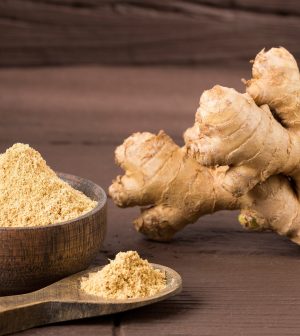- USDA Gets Tougher on Salmonella in Raw Breaded Chicken Products
- Fragments of Bird Flu Virus Found in 1 in 5 Milk Samples
- Clients Got HIV Through ‘Vampire Facial’ Microneedling Treatments
- Take the Stairs & Step Up to Longer Life
- ‘Drug Take Back Day’ is Saturday: Check for Leftover Opioids in Your Home
- Loneliness Can Shorten Lives of Cancer Survivors
- A Stolen Dog Feels Like Losing a Child, Study Finds
- Healthier Hearts in Middle Age Help Black Women’s Brains Stay Strong
- Better Scans Spot Hidden Inflammation in MS Patients
- Which Patients and Surgeries Are ‘High Risk’ for Seniors?
Ginger May Ease Inflammation of Autoimmune Diseases

Ginger supplements may help those with certain autoimmune diseases, such as lupus and rheumatoid arthritis, control inflammation.
New research has added evidence to support the impact of ginger on white blood cell function, particularly a type of cell called a neutrophil.
The researchers were particularly interested in neutrophil extracellular trap (NET) formation, also called NETosis, and its role in controlling inflammation.
When healthy people take ginger, the study found, their neutrophils are more resistant to NETosis.
NETs are microscopic spider web-like structures. They propel inflammation and clotting, which contribute to many autoimmune diseases, including lupus and rheumatoid arthritis.
“There are a lot of diseases where neutrophils are abnormally overactive,” senior co-author Dr. Kristen Demoruelle, associate professor of medicine at the University of Colorado School of Medicine, said in a university news release. “We found that ginger can help to restrain NETosis, and this is important because it is a natural supplement that may be helpful to treat inflammation and symptoms for people with several different autoimmune diseases.”
A clinical trial with healthy volunteers showed that a week of daily intake of 20 mg of gingerols boosted a chemical inside the neutrophil called cAMP. These high levels of cAMP then inhibited NETosis’ response to the disease.
“Our research, for the first time, provides evidence for the biological mechanism that underlies ginger’s apparent anti-inflammatory properties in people,” said senior co-author Dr. Jason Knight, an associate professor in the division of rheumatology at the University of Michigan.
The researchers said they hope that this evidence, including how ginger impacts neutrophils, will encourage health care providers and patients to discuss whether taking ginger supplements could be beneficial as part of their treatment plan.
“There are not a lot of natural supplements, or prescription medications for that matter, that are known to fight overactive neutrophils,” Knight said. “We, therefore, think ginger may have a real ability to complement treatment programs that are already underway. The goal is to be more strategic and personalized in terms of helping to relieve people’s symptoms.”
The research team hopes to do clinical trials in patients with autoimmune and inflammatory diseases such as lupus, rheumatoid arthritis and COVID-19.
The study findings were published Sept. 22 in JCI Insight.
More information
The U.S. National Institutes of Health has more on autoimmune diseases.
SOURCE: University of Colorado Anschutz Medical Campus, news release, Sept. 22, 2023
Source: HealthDay
Copyright © 2024 HealthDay. All rights reserved.









